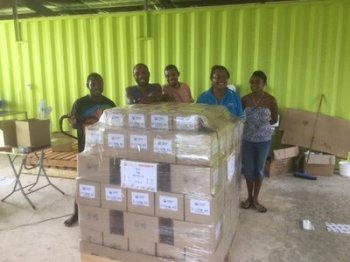
Tanna Farms, a first-of-its-kind joint venture between a ni-Vanuatu seasonal worker and his New Zealand-based employer in the Recognised Seasonal Employer (RSE) scheme, was badly hit as the cyclone ploughed its way across Tanna Island. The company, established only a few years ago, is a JV between South Island-based company, Vinepower directors Jono Bushell and Jason Kennard, and ni-Vanuatu partner, Seth Kaurua.
In the months before Cyclone Pam, Tanna Farms was beginning to gain traction with exports of virgin coconut oil (VCO) into the New Zealand market. Its products were well received in some of Auckland’s upmarket stores.
Cyclone Pam couldn’t have hit Tanna Farms at a worse time, but with characteristic Kiwi can-do attitude, promoters Bushell, Kennard and Kaurua with their farm workers on the devastated island rose to the occasion, rebuilt the VCO facility and are not only back in business but have hit the ground running: the rebuilt VCO facility is much bigger, better and stronger than before. Tanna Farms is now producing more value-added products for exports – VCO, peanut butter, soap and lip-balm.
Pacific Islands Trade & Invest (PT&I) Head of Investment and Chief Operating Officer, Manuel Valdez, says, “This is a classic case study of investment and trade development strategy. It started from humble beginnings of a PT&I-initiated investment mission to Vanuatu which then grew into a joint venture between a NZ RSE employer and a former RSE worker.”
By investing and redeploying their earnings when they return to their home countries, RSE workers help substantially raise their families’ and communities’ living standards. “They send their children to school, build houses, start a new small business in the community, open up a car/jeep rental business for foreign tourists, plant annual crops and even set up a joint venture with their former NZ RSE employers, as in the case of Tanna Farms,” Valdez adds.
The directors of Tanna Farms, in the past few years, have leased a number of farms in which they have planted coffee, peanut, taro plants, fruits and vegetables to serve as daily sustenance while they were still developing the VCO products for exports. One coconut farmer said, “Many of those plantations were abandoned to weeds after the market for Tanna Island copra dried up in the 1980s and we pride ourselves on helping revitalise a vital industry. It encourages the community not to just rely on their old coconut trees, but to start planting new ones.”
Bushell says the Tanna Farms coconut oil mill has revitalised the coconut plantations and providing farmers with a new income source while upskilling people and increasing their work opportunities. “We don’t want a situation where the people can make money, but not grow their own food. This is about creating sustainable futures for the people of Tanna Island.”
Sustainability is at the core of Tanna Farms activities. Their coconut oil is completely natural, handmade and created with a hundred per cent renewable energy source. The DME (direct micro expelling) process, which they follow, uses coconut shell and husk as fuel, so that nothing goes to waste. As for their peanuts – which are cooked in coconut oil and roasted to perfect crunchiness — are 100% natural, with a growing demand. Tanna Farms also produces coconut soap that is made by hand using coconut oil, then wrapped in brown paper to sell to end-consumers.
Kaurua is pleased to see the islands products go places, “The Vanuatu-New Zealand partnership of Tanna Farms is taking his island’s coconut oil to the world. We’re building a bridge from Tanna Island to Port Vila, New Zealand and Australia. And it’s changing lives.”



 Classifieds
Classifieds

